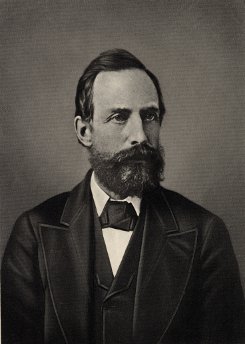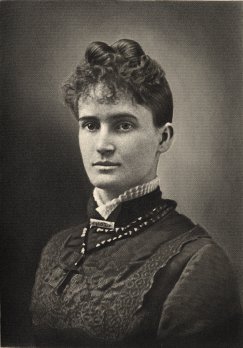James Van Horn Scovill, who passed away at his home on the Oxford Road in New Hartford, February 9, 1923, was one of the pioneer agriculturists of Oneida county and among the first to see the great possibilities of the dairy industry, for which the Empire state has become noted. His work marked a distinct advance in farming methods and standards, and actuated at all times by the spirit of progress, he became a recognized leader in his chosen vocation, converting a private enterprise into a public asset. He had a kindly philosophy, a clear outlook upon life, and few men have occupied a warmer place in the hearts of their fellow citizens. He was born in Paris, Oneida county, New York, on July 29th, 1834, and belonged to one of the oldest families of that community, in which his grandfather, Darius Scovill, settled about 1801, locating at Paris Hill. He had previously resided in Watertown, Connecticut, which city was the birthplace of his sons, Seabury, Edward and Isaac, and the last named became the father of James V. H. Scovill. His mother, Jane (Murrow) Scovill, was a daughter of Thomas Murrow, and in the maternal line traced her ancestry to the Van Horns of New York. She was the last representative of this old and celebrated family and one of the treasured possessions of the Scovill family is a very interesting document which contains original records of births in the family of Jacobus Van Horn of New York, whose father, John Van Horn, was one of the earliest settlers in Manhattan, now known as New York city. The manuscript is written in the Dutch language, in beautiful script, and is dated 1732. The information which it contains is verified in the Colonial History of New York [i.e., Documents Relative to the Colonial History of New York].
James Van Horn Scovill was an only child. His elementary training was received in his native town and he afterward attended the Clinton Liberal Institute and the Cazenovia Seminary. He followed agricultural pursuits at Paris Hill for a time and in 1884 removed to New Hartford, where he purchased about sixty acres of garden land, which he utilized for dairy purposes. He specialized in the raising of thoroughbred Jersey cattle and named his place Jersey Hurst. The buildings were clean and sanitary, supplied with modern equipment, and everything about his farm bore evidence of the careful supervision and enterprising methods of its owner. The butter and cheese from his dairy were unsurpassed and their quality was the direct result of system and science in their preparation.
Mr. Scovill was considered an authority on matters pertaining to the dairy industry and when the Centennial Exposition was held in Philadelphia, Governor Seymour appointed him a member of the commission in charge of the state dairy exhibit. He acted as chairman of the commission and aided in forming the American Dairymen's Association, of which he was a prominent member. He was connected for some time with the Grange and served on the executive committee of the State Agricultural Society. He was the oldest member of the Central New York Farmers Club and for several years was its vice president. Of his work in this connection the Utica Press said editorially in its issue of February 12, 1923:
"James V. H. Scovill was the last of that group which organized the Central New York Farmers Club, for many years the sole organization of its kind in this part of the state. Others of the group were Horatio Seymour, who was the first president of the club; E. P. Powell of Clinton, who wrote much on agricultural topics; and the venerable Joseph E. Graham of New Hartford, who was also president of the club for many years.
"The present generation little realizes what the Central New York Farmers Club accomplished for this and other communities. It was composed of active and progressive farmers who had a vision of the coming need of agriculture. They understood the problems of the farmer and foresaw what the future would demand if the industry proposed to prosper. In other words, they realized that the farmer required scientific training and education and, although they were pioneers in the cause, and saw but vaguely the means that should be adopted, they had the courage to express themselves with conviction.
"In those days scientific farming was taboo among the rank and file and its advocacy not always popular. But the members of the Central New York Farmers Club persisted in their work and there is no question but that they were influential in inaugurating the farm movement, so-called, which is now so well defined in this country and embraces all the interests of the rural residents, such as farm schools, good roads, scientific dairying and agriculture, and cooperation. The club was for discussion and education only and when the time came for crystallizing its thought into performance and action, other organizations took up its work and it ceased its activities. One of the charter members, Mr. Scovill, never lost interest in its work. He was a regular attendant at its meetings and as a student of agriculture, with progressive views, he always contributed something valuable to the discussion. As a member of this organization, he participated and assisted in a movement that has been of incalculable benefit to the rural community."
On June 1, 1882, Mr. Scovill was married to Miss Annie Dewhurst, eldest daughter of Thomas and Anne Dewhurst of Graefenberg, Herkimer county, New York, and formerly of Willowvale, Oneida county, where Mrs. Scovill was born. She survives her husband, and of the six daughters born of their union, five are living: Jennie Belle, the wife of H. J. Cotcher, of Detroit, Michigan, and the mother of one son, Ralph Winston Cotcher; and Bessie Murrow, Cornelia Mae, Helen Eliza and Marianne Howard Scovill, all residents of New Hartford. The sixth child, Grace Leona, died in January, 1914.
Mr. Scovill was an adherent of the democratic party, by which he was twice nominated as a candidate of the state assembly in a district hopelessly republican. He belonged to the Oneida County Historical Society and in religious faith was an Episcopalian. While residing at Paris Hill he joined St. Paul's church, of which he became a vestryman, and after coming to New Hartford was affiliated with St. Stephen's church, of which he was vestryman and warden. He was a man of deeply religious nature, keenly interested in the moral as well as the material progress of his community, and since 1873 had acted as a vestryman in one church or the other. Ever genial and courteous, he had surrounded himself with an extensive circle of loyal friends, whose admiration for his ability was surpassed only by their respect for his integrity and exemplary traits of character.

